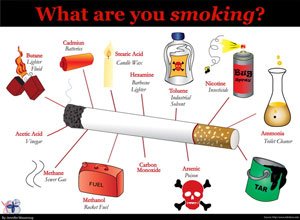Cigarette smoking has been making a large impact in media forms such as television and movies.
Celebrities are lighting up on-screen and glorifying the act of smoking.
Although Hollywood is subjecting us to this harmful habit, there are still two main tenets that hold true among health professionals and experts: smoking is BAD for your health and it is NEVER too late to quit!
What are you Smoking?
Cigarettes contain some nasty chemicals including benzene (a very toxic and cancer-causing chemical), hydrogen cyanide, rat and human poison, toxic metals, and much more.
When your lungs inhale smoke from a cigarette, these chemicals enter your body and force your body to fight to get rid of them. The constant need to fight and repair causes wear and tear on your organ systems.
This results in conditions such as chronic bronchitis and other lung diseases. After years of smoking, a condition known as fibrosis can also occur in the lungs.
Now, instead of being able to expand your lungs to breathe, fresh oxygen intake decreases and becomes less efficient.
Reduced oxygen intake can cause many serious issues for all parts of the body, from the cells to various tissues, organs, and organ systems (e.g. the cardio-respiratory system- the system that includes the heart, lungs, and blood vessels).
Changing who you are for the worse
Some of the chemicals in cigarette smoke are classified as carcinogens. These chemicals are known to cause cancer.
Your body cannot easily remove these carcinogens and as a result, they stick around interacting with things such as your DNA. Your DNA is your genetic makeup and contributes to shaping every beautiful and unique piece of you.
Malicious carcinogens try to mutate, or alter, your DNA and promote abnormal growth and changes.
If you smoke and expose the delicate cells inside your body to harmful cigarette smoke toxins you are multiplying the chances of developing diseases of the mouth, heart, lung, and brain, to name a few.
Changing who you are for the better
I want to be healthy! What is available to help me quit smoking?
Nicotine replacement therapies (NRTs)
Nicotine replacement works by giving your body steadily decreasing doses of nicotine to help wean you off the addictive nature of cigarettes.
This type of therapy comes in the form of nicotine patches, gums, inhalers, and lozenges.
Medications
Two well-known prescription medications are available should your physician recommend this form of therapy.
The first is Zyban which works by decreasing the intensity of nicotine cravings and withdrawal symptoms.
Champix, which has the highest smoking cessation rate, also works to reduce cravings and withdrawal symptoms, in addition to decreasing the pleasure that is derived from smoking.
Behavior modification therapy
It is well known that adequate support systems that are in place for those trying to quit substantially increase success.
There are many types of support groups including online web-based groups, telephone support, regular support group meetings, educational sessions set up through community centers, and others.
Another key component of support groups is that they are targeted to very specific populations.
Current clinical research in smoking cessation
The majority of new smoking cessation research involves individualized support.
One interesting example of this involves targeting men who will soon have a baby with their significant other.
The study is looking at whether a self-help smoking cessation guide in addition to couple counseling is just as good as or better than a self-help guide alone for expectant fathers.
Another interesting research study is testing the effectiveness of a nicotine vaccine that would work almost the same as a regular vaccine.
When nicotine enters your lungs from a cigarette, it is rapidly passed into your bloodstream to be distributed throughout your body, including to the brain.
In the brain, nicotine causes the release of ‘feel-good’ chemicals such as dopamine. This vaccine would work by creating antibodies that find nicotine molecules and attach themselves to the nicotine so they cannot make it into your brain cells.
This lowers the pleasure derived from smoking and thus makes it easier to quit.
Fun fact
Smoking has been shown to increase insulin resistance (i.e. the diminishing function of insulin) and may contribute to the development of type 2 diabetes.
When someone is already diabetic, smoking can further diminish insulin function.
Did you know?
May 31st is World No-Tobacco Day every year. Will this day mark the start of your new smoke-free life?
Other topics that may be of interest:
- Varenciline and Bupropion Produce Positive Effects on Smoking Cessation, with no difference in Adverse Neuropsychiatric Events
- Quitting Smoking Abruptly Yields Longer Abstinence
- Thinking About Quitting Smoking? The Nicotine Patch May Not Be the Best Choice
- E-cigarette Use Improves Smoking Cessation Rates



